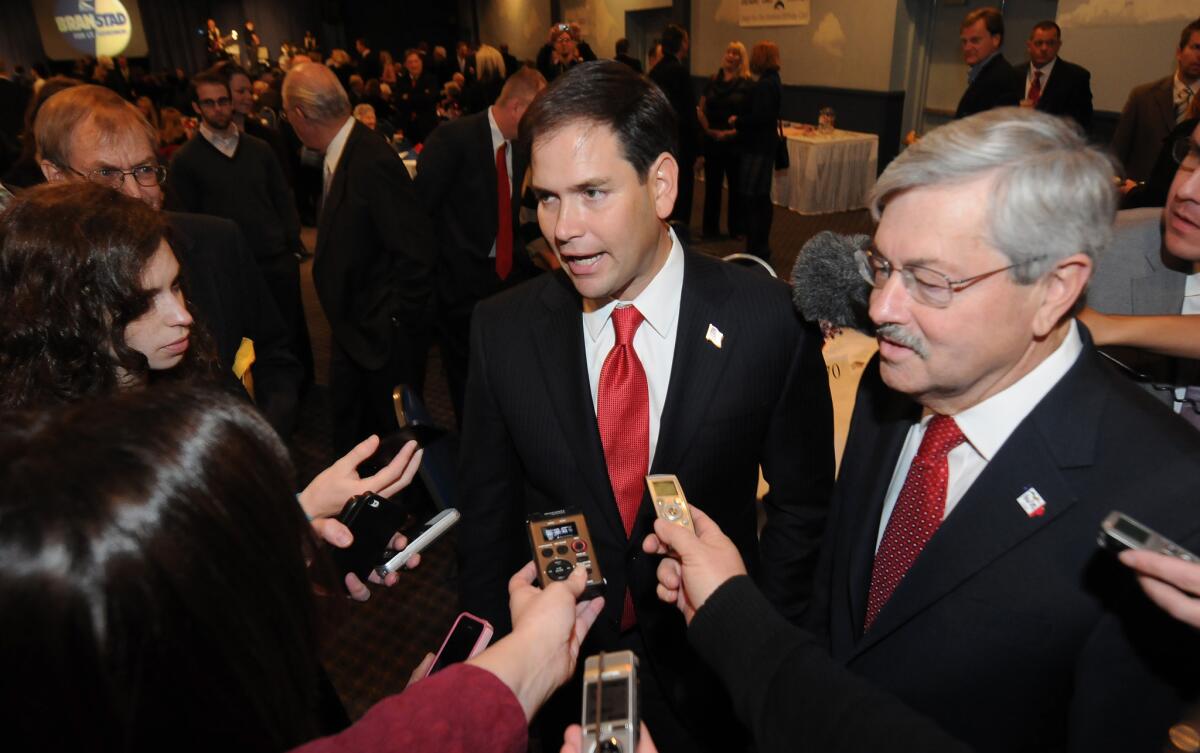McManus: The GOP looks inward

No political party enjoys losing an election, but a healthy party reacts to defeat — after a suitable period of grieving — by trying to figure out what went wrong.
That’s what Democrats did in the late 1980s after a string of failed presidential campaigns, and the process led to the election of Bill Clinton, a moderate Southern governor.
And that’s what many Republicans are trying to do now, after the defeat of Mitt Romney in November. They’re pondering what went wrong and how the party needs to change.
But there’s a divide in the GOP. Some conservatives don’t see the party as being in crisis at all. In their view, the problem was minimal and largely mechanical: We nominated an unappealing candidate; we fell behind in campaign technology; we forgot to reach out to Latinos. Once voters realize their mistake, this faction says, they’ll come around.
The two viewpoints are on elegant display in the January issue of the magazine Commentary, which collected essays from 53 conservatives about the future of their movement. Some of the prescriptions from the stand-pat side are oddly passive: Don’t overreact to one bum election. Just wait for President Obama and the Democrats to make mistakes, and watch the voters come streaming back.
On the other side — let’s call them the big-change camp — there’s real soul-searching. “The Reagan program no longer speaks to the needs or concerns of most Americans,” warns Ramesh Ponnuru of the National Review. “Before conservatism can have a future, it has to grapple with the present.”
Nowhere is the divide deeper than on social issues. Some Republicans, like screenwriter Roger Simon, would like to see them removed from the discussion: “They are not the province of government and cannot, in the real world, be legislated.”
On the other side of the argument is George Weigel, the leading traditionalist Catholic scholar: “Decadence and democracy cannot coexist indefinitely,” he warns.
Another full-throttled debate is over economic issues and the role they played in the Republican loss. One camp suggests that the party’s relentless focus on economic freedom and entrepreneurship during the campaign was on target; the other suggests that the message failed to connect with most voters, who aren’t entrepreneurs.
Michael Gerson, a former speechwriter for President George W. Bush, warns that the party isn’t speaking to the real concerns of the middle class. “People … worried about insecure health benefits tied to insecure jobs or seeking government help to master skills demanded by technological change are generally not mooches or dependents,” he writes. “Greater economic freedom is not the answer to all their concerns.”
So what should the GOP be doing? Instead of merely railing against the “entitlement state” (the new, more dignified term for the system that supports the 47% of the electorate that Romney decried), it should get to work on reforming it, bit by bit.
“An updated conservatism would still seek to reform the tax code, but in a way that might lighten the burden of payroll taxes on middle class parents,” Ponnuru recommends. “It would resist federal micromanagement of health insurance, but do so while advancing better proposals to make insurance affordable.”
Again, others aren’t ready to go there. Some still think Romney was right when he dismissed 47% of the electorate as deadbeats. That sentiment contained “more truth than distortion,” writes Heather Mac Donald of the Manhattan Institute.
And to many conservatives, a swing of the pendulum in their direction is all but inevitable.
“The implementation of Obamacare will unleash a fury that will make the emergence of the tea party in 2009 look tame,” forecasts Paul A. Rahe of Hillsdale College, Mich.
Historically, governing parties — on both sides — do overreach, sooner or later. The question is how long Obama and his Democrats can extend their electoral success: until the congressional election of 2014, the presidential election of 2016, or beyond?
As writers and thinkers debate the issue, some ambitious politicians in the Republican Party aren’t waiting to see. They have at least tacitly acknowledged that they have a problem, the first step in any self-help effort.
In a speech last month, Rep. Paul D. Ryan (R-Wis.), Romney’s running mate, repudiated the candidate’s division of the nation between makers and takers. “We must speak to the aspirations and anxieties of every American,” Ryan said.
Another potential 2016 presidential candidate, Sen. Marco Rubio (R-Fla.), sought in a recent speech to recover the GOP’s lost standing as a champion of the middle class — in part by invoking that phrase no fewer than 34 times
So far, the only real change has been of language and tone — not policy. But it’s a start.
Meanwhile, in the other party, Democrats are also debating what their party’s focus should be. But that will have to wait for another column.
Follow Doyle McManus on Twitter @DoyleMcManus
More to Read
A cure for the common opinion
Get thought-provoking perspectives with our weekly newsletter.
You may occasionally receive promotional content from the Los Angeles Times.







